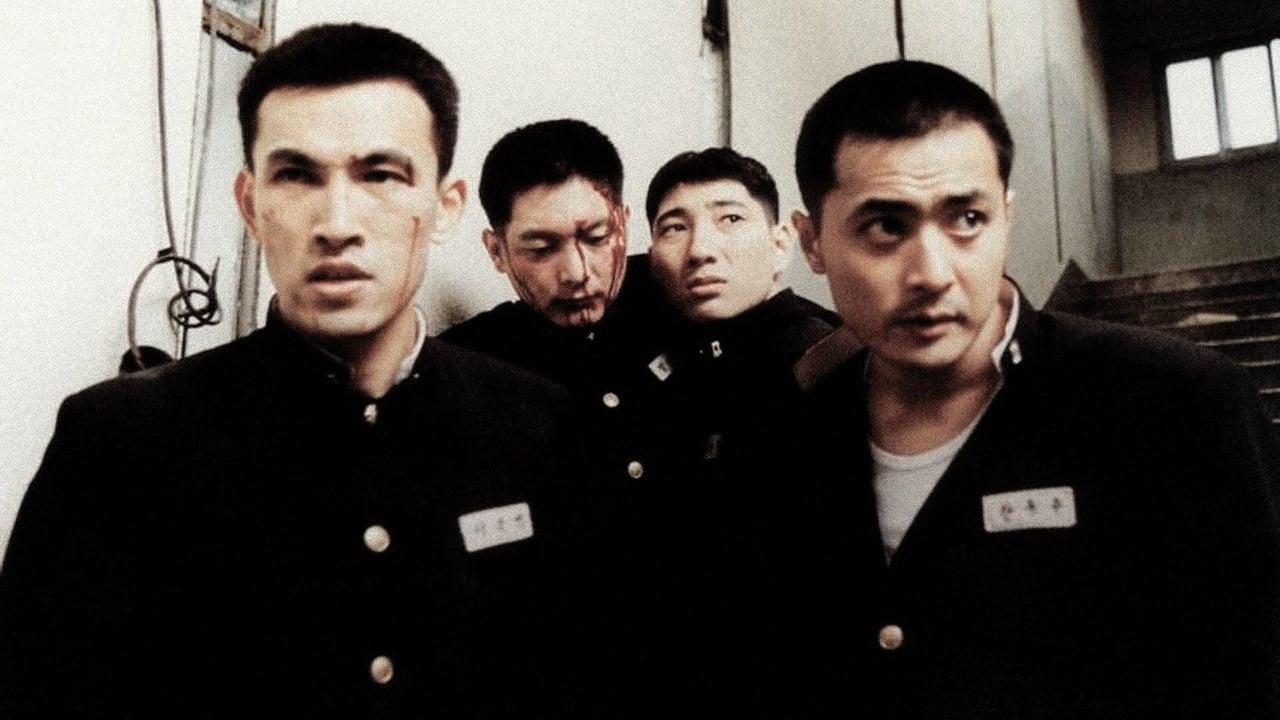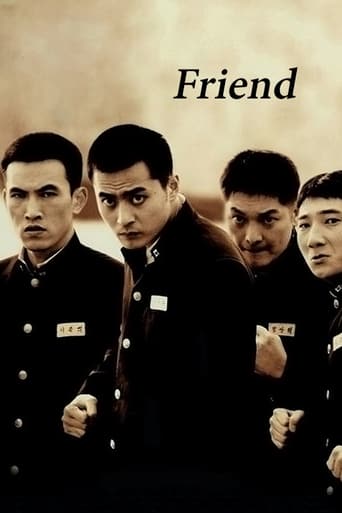



It’s not bad or unwatchable but despite the amplitude of the spectacle, the end result is underwhelming.
View MoreI enjoyed watching this film and would recommend other to give it a try , (as I am) but this movie, although enjoyable to watch due to the better than average acting fails to add anything new to its storyline that is all too familiar to these types of movies.
View MoreThere is, somehow, an interesting story here, as well as some good acting. There are also some good scenes
View MoreThe tone of this movie is interesting -- the stakes are both dramatic and high, but it's balanced with a lot of fun, tongue and cheek dialogue.
View MoreWhen director Kwak Kyung Taek works portions of this film as period pieces, the results are nothing short of spectacular beauty. Scenes depicting 1976 and 1981 alone are worth the price of this film.Sadly, the broader story of friendship gone awry is bogged down by clichés and melodrama and stereotypical gangster character faux angst. The plot is incidental to the message that Kwak tries to convey with this film: pure and innocent youthful friendship can be undone by the broader, but ultimately less important, adult world concerns of lust, greed and power. Indeed, the plot has been so often done that there is no need to relate it in this review. Suffice it to say that two young friends become, as adults, underworld gangster rivals in Pusan, South Korea, with plenty of that old stand-by, bloodshed, thrown in.The beauty of "Friend" starts when two friends, Joon Suk and Dong Su, along with two other friends who don't become gangsters, try to examine sex as kids. In an amusing scene, the group confuses the word "menstruation" with "vagina." This leads to some hilarity for viewers later as the sex-crazed kids go about typical early teenage shenanigans.Similarly, much later in the film, a precious scene unfolds when one of the non-gangsters visits the lair of one of his gangster friends and, while engaging in friendly banter, asks him why he, as a gangster, speaks of philosophy when he is but a "hoodlum." The gangster's henchmen get itchy (a la "The Godfather") and the gangster, instead of killing or torturing his friend, humiliates his own henchmen for overreacting by placing them in compromising positions in a car trunk. "How dare you suspect my friend and guest," he spits at his erstwhile protectors.Such portrayals of true friendship predominate until the last quarter of the film when the rivalry between the two former friends, the gangsters, erupts into stereotypical over-the-top violence reminiscent of DePalma and Pacino. And while these latter scenes are apparently meant to provide the purpose and meaning of "Friend," they come off as clichéd shoot-em-ups, filled with ho-hum dialogue and predictably "tense" scenes that come up disappointing.Still, Kwak displays instances of brilliance, such as when he portrays the rebellious underworld of South Korea in 1981 under Chun Doo Hwan's military dictatorship. Women smoking cigarettes was taboo even when I visited the country more than a decade later. Kwak is able to depict subtle scenes of rebellion in a subtle manner, and these are the gems of the film that resonate: A stunning performance by a female rock band. A running away scene with Robert Palmer's "Bad Case of Loving You" blaring in the soundtrack. A "West Side Story" type brawl in a theater while a government propaganda newsreel runs in the background. Shades of "Quadrophenia" and "Romper Stomper" prevail throughout the early half of the film, and when they do, its scenes are effectively cut with enough humorous interludes that a viewer does not want the film to progress into the "epic saga" that it eventually tries, with limited success, to become.Former friends Joon Suk and Dong Su become reluctant adversaries and Kwak attempts to use this setting as a vehicle for a commentary on friendship. It works if your idea of friendship is apologizing to your best friend as he dies at your hand, or if confessing to that murder to face a certain death penalty qualifies as redemption. After a lot of violence and prison-cell soul-searching, the film concludes with a sentimental look back at the halcyon days of the friendly boys' respective childhoods. In this reviewer's opinion, it doesn't work. What does work is Kwak's initial representation of the boys' coming of age. If he had stayed there, this film could have been a lovely revelry in the ridiculous and absurd world of happily ignorant boyhood.Instead, Kwak tries for a home run when all the friends really need is a base hit.
View MoreThis is quite possibly one of the most powerful movies I've seen. By far it's the best South Korean movie.It's a story about four companions who grow up together in South Korea. The four friends go throughout life always keeping in touch with each other, helping each other out, and always remain by each others side ;). Not only does the film contain some intense fight scenes, but it amazingly illustrates the bond that four kids can share with each other. Despite what other reviews may say, if you're interested in a good movie to watch with a best friend or girlfriend, I highly recommend this.
View MoreThis move does not cross the east/west cultural barrier very well. I am not sure if non-asians can fully understand the confucian harshness and its effects on the Korean society. Nonetheless, like all great movies, this movie strikes at both the heart and the mind in unison.It intrigues our intellect with subtleties. It leaves us to wonder why the characters behave the way they do. Why must one friend murder an another? It isn't always clear. Why does one friend chooses an another friend as his favorite? No can be sure. Yet there are reasons.It moves our emotions because the movie is about the true meaning of friendship. It is loyalty above all else, even to the point of forgiving and understanding a friend who murders an another. Among friends, there is no hatred or bitterness, only forgiveness, understanding, and support.The acting is second to none. Both the lead and the supporting actors won the best acting awards at an international film festival. When the murderous and treacherous friend becomes himself murdered, it is a profoundly sad moment. Then we realize that we have come to love and care for the characters, despite their flaws, because we come to respect them as human beings capable of deep and profound friendship unlike any other.Finally, the director did an incredible job of enhancing the allure of the main female character. Her on stage lip lyncing performance as the lead singer of a high school band was shot beautifully. Understandably, all the characters fall in love with her at that moment, and so does the audience.
View More'Friend" is a very Korean film about four best friend boys who grow up in Pusan (circa 1970ish) but take different paths through life. An artistically and technically good treatment of an old theme, this film is a slow moving drama which buries itself in typically Asian melodramatic style in angst and woe over issues of loyalty, friendship, betrayal, honor, etc. "Friend" eventually becomes a bit of a mess spending too much time on long shots during which we're supposed to relish in the sentiment of the moment while dedicating too little time to explaining exactly what these gangster guys do beside talking tough and trying to look cool. One gets the impression being a gangster in South Korea is quite like any other occupation and there are probably ads for gangsters in the career ops section of the local newspaper. This film is made for and was a big hit with Korean audiences. It does not, however, make it well across the East/West divide. A subtitled watch for young adult males into Eastern films. (C+)
View More